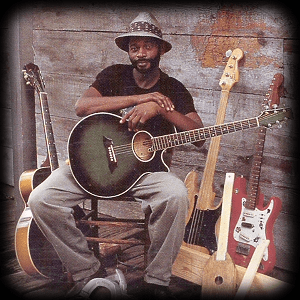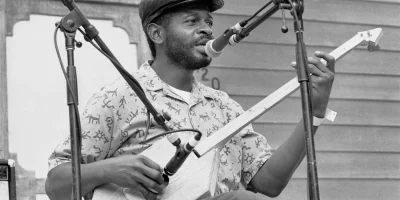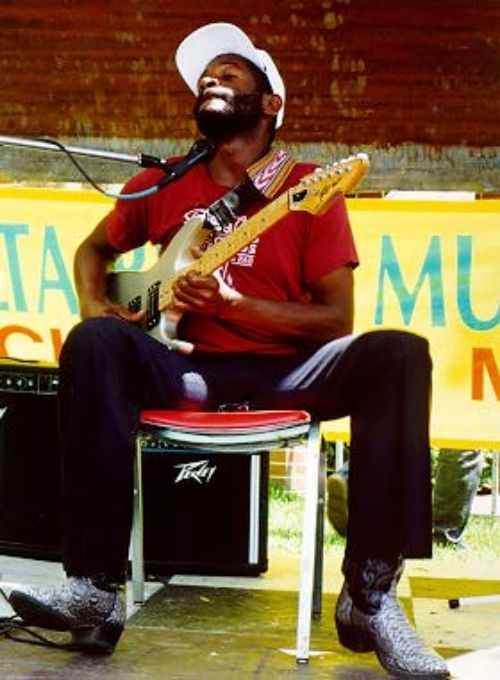A Site About Dead Musicians and How They Got That Way

Lonnie Pitchford: Age 43 | Cause Of Death: AIDS
(b. 8 October 1955, d.8 November 1998)
Mississippi blues guitarist Lonnie Lee Pitchford, who had carried on the legacies of blues legends Robert Johnson and Elmore James, died of complications from HIV on Nov. 8 at his home in Lexington, Mississippi. He was 43. Pitchford had toured Europe and Australia and had played American venues such as the Rock and Roll Hall of Fame, the Chicago Blues Festival, the Delta Blues Museum, and the Smithsonian Festival of American Folklife.
Obituary
Delta Blues Musician Lonnie Pitchford
By JON PARELES
Lonnie Pitchford, a Mississippi bluesman who was dedicated to reviving early Delta blues, died on Nov. 8 at his home in Lexington, Miss. He was 43.
The cause was pneumonia complications, said his manager, Patty Johnson.
Pitchford performed around the world and appeared regularly in New York, often in concerts presented by the World Music Institute. He played the diddley-bow, a one-stringed instrument he would assemble onstage from a two-by-four, two nails, broom wire and a crushed snuff can. Using a dime as a slide, he would play driving, wailing blues lines.
He also played guitar and occasionally piano, singing classic Delta blues with a pensive, haunted voice.
The diddley-bow was Pitchford’s first instrument, made from baling wire nailed to the side of his family’s house in rural Lexington.
He sang in the church from childhood on and learned to play piano; he was 12 when he began sharing a guitar with his four brothers.
Pitchford learned traditional Delta blues from Eugene Powell (who had played with the Mississippi Sheiks in the 1930s) and from Robert Junior Lockwood, whose stepfather was Robert Johnson.
Pitchford’s wife, Minnie, is the daughter of Elmore James’ girlfriend, and Pitchford learned some Elmore James songs that had been left with his mother-in-law.
He began performing outside Mississippi as a teen-ager, appearing at the Smithsonian Institution’s Festival of American Folklife from 1972 to 1991.
By the 1990s he had toured in Europe and Australia as well as the United States. When not on the road, he worked as a carpenter.
He appeared in the documentaries “The Land Where the Blues Began” (1980) and “Deep Blues” (1992), and was recorded for five blues anthologies before he made his first solo album, “All Around Man,” for Rooster Blues Records in 1994. He was working on an album for Mississippi Crossroads Music. He also made an album with the New Africa String Band, which included Powell and Big Jack Johnson.
Pitchford is survived by his wife; his mother, Rosie Pitchford; two sisters, Ersine Hodges and Brenda Jones, and four brothers, Willie Douglas, Andrew James, Edward Charles and Roosevelt, all of Mississippi.
Lonnie Pitchford
Written by Jim O’Neal
Mississippi blues guitarist Lonnie Lee Pitchford, who had carried on the legacies of blues legends Robert Johnson and Elmore James, died of complications from HIV on Nov. 8 at his home in Lexington, Mississippi. He was 43. Pitchford had toured Europe and Australia and had played American venues such as the Rock and Roll Hall of Fame, the Chicago Blues Festival, the Delta Blues Museum, and the Smithsonian Festival of American Folklife.
Pitchford was noted for his performances on his homemade one-string “diddley bows” as well as for his work on acoustic and electric guitar. In 1996 his slide guitar playing was featured on one track of a John Cougar Mellencamp CD.
Pitchford’s only full CD, All Around Man, was released by Rooster Blues Records in 1994. That CD included
songs he had learned from Robert Johnson’s protege Robert Jr. Lockwood, as well as a previously unrecorded track that Lonnie’s mother-in-law had learned from her friend, the late slide guitar master Elmore James. Pitchford will be buried on Nov. 14 at the same cemetery where James was laid to rest in 1963, the Newport Community Cemetery near Ebenezer, Mississippi. Services will be held at 11:30 a.m. at the Newport M.B. Church.
During the ’70s and early ’80s, Pitchford lived in Kansas City, Lexington, Chicago, and Kalamazoo, Michigan. He had spent the last several years in Clarksdale, Mississippi, where he performed and recorded, or around his hometown of Lexington. He often worked as a carpenter, and played in gospel groups as well as blues bands. He had been working on a second album for Rooster Blues in late 1997 before his illness sidelined him. A few months before his death he played Elmore James’ guitar on a brief session produced by Pat LeBlanc, administrator of
the Elmore James estate.
For more information about Lonnie Pitchford go to
Delta Musicians
Biography
Lonnie Pitchford
Lonnie Pitchford, b. 08 October 1955, Lexington MS, d. 08 November, 1998
He was born and raised about five miles outside of Lexington, a rural Mississippi town not far from Clarksdale. Lonnie Pitchford is one of the most versatile musicians you will ever hear. He’s played one room juke joints and Carnegie Hall. He is a carpenter by trade and he is good at his work. He’s built his own guitars and his own house. A guiet man who never lets on he is a world famous musician; Lonnie can be seen around Clarksdale wearing his carpentry belt and carrying on his trade. Lonnie began making one string guitars as a child and taught himself to play them. He often constructs one on stage and then proceeds to amaze audiences with his abilitiy to get incredible sounds from it. He also builds a one string guitar known as the Diddley Bow. He can get more from his Diddley Bow than a lot of guitarist can get from their Strat.
In 1974 Lonnie became an over night wonder when the Smithsonian discovered his ability to bring the material of the ledgendary Robert Johnson to life. He was 17 years old and whisked off to Washington DC to play at the National Folk Festival. He banged together his one string guitar on stage at the festival and proceeded to teach the audience about the Blues.
Lonnie is not limited to his Diddley Bow. He is equally at home with the Strat. On his latest CD release “All Around Man” he plays acoustic guitar, diddley bow, electric slide, lead, rhythm, bass, piano, and mouth harmonica. Proving he is an all around musician.
Links
- Delta Boogie Bio
- Obit by Jim O'Neal (photos)
- Sara Muckler's article
- Rock and Roll Hall of Fame (incl. photo w/ diddley bow)
- Business number/address


